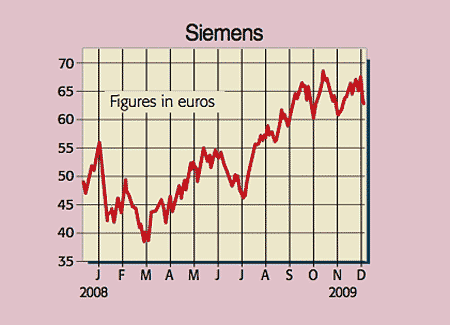Get the latest financial news, insights and expert analysis from our award-winning MoneyWeek team, to help you understand what really matters when it comes to your finances.
You are now subscribed
Your newsletter sign-up was successful
Want to add more newsletters?

Twice daily
MoneyWeek
Get the latest financial news, insights and expert analysis from our award-winning MoneyWeek team, to help you understand what really matters when it comes to your finances.

Four times a week
Look After My Bills
Sign up to our free money-saving newsletter, filled with the latest news and expert advice to help you find the best tips and deals for managing your bills. Start saving today!
Europe's largest engineer makes everything from high-speed trains and medical scanners to power generators and light bulbs.
Around 40% of its earnings come from cyclical industries such as automotive and property services. The rest are generated by longer-term themes such as infrastructure, green technologies and healthcare.
Indeed, Siemens has its fingers in so many pies that it is treated as a bellwether for the fitness of the global economy in competition with other industrial giants such as Emerson, ABB, GE and Philips. True, the company has not escaped the recession, but there are several reasons why it still rates as a solid buy for the patient investor.
MoneyWeek
Subscribe to MoneyWeek today and get your first six magazine issues absolutely FREE

Sign up to Money Morning
Don't miss the latest investment and personal finances news, market analysis, plus money-saving tips with our free twice-daily newsletter
Don't miss the latest investment and personal finances news, market analysis, plus money-saving tips with our free twice-daily newsletter
First, Siemens has a chunky €81.2bn order book, and therefore a strong forward earnings stream. Next, its immense scale and the fact it is No. 1 or No. 2 in most of its chosen markets mean it should prove resilient even if faced with a second economic downturn.
Third, Siemens continues to rebalance its various divisions by shedding some of its more cyclical businesses and increasing its exposure to areas with more predictable income streams. For example, in early 2008 it offloaded its VDO Automotive unit to Continental for a whopping e11.4bn. More recently it kicked off the auction of its consumer-focused hearing-aid business, thought to be worth €2bn.
Siemens (DAX: SIE), rated OUTPERFORM by Credit Suisse

The business also enjoys a wide geographic spread. Siemens derives around 30% of its sales from high-growth emerging nations, another 51% from Europe and only around 19% from the more difficult US region. And despite the challenging conditions expected in 2010 which could mean a mid-single-digit decline in sales underlying earnings are predicted to rise 20%. That's largely thanks to cost savings that will bolster the bottom line.
For example, Peter Lscher, Siemens CEO, said recently that "efforts to cut the cost of its supply chain were bearing fruit, with targeted savings of €2bn per year achieved ahead of schedule. Supplier numbers have been cut from 113,000 to 97,000, with the goal of reducing the number by a further 6,000. Meanwhile, the share of goods purchased from low-cost countries is to be lifted from 20% to 25%."
The City is forecasting 2010 revenues and underlying earnings per share (EPS) of e74bn and €4.7 respectively, rising to €77bn and €5.7 in 2011. This puts the shares on undemanding price/earnings (p/e) ratios of 12.9 and 10.6. The balance sheet is also sound with net debt (debt minus cash balances) at a comfortable €5.1bn. However the firm's €4bn pension deficit needs to be watched. I value the group on a 'through-cycle' operating profit (Ebita) multiple of 11. Assuming 10% profit margins are sustainable, that generates an intrinsic worth of around €80 per share.
So are there any catches? Siemens would suffer in the event of another severe global slump or if its restructuring plans failed to deliver the desired benefits. Additionally, the strong euro isn't helping matters in its export markets. All the same, with state-of-the-art technology across a broad spectrum of markets and regions, the stock still rates as a solid buy.
Recommendation: BUY at €60.61
Paul Hill also writes a weekly share-tipping newsletter, Precision Guided Investments
Get the latest financial news, insights and expert analysis from our award-winning MoneyWeek team, to help you understand what really matters when it comes to your finances.
Paul gained a degree in electrical engineering and went on to qualify as a chartered management accountant. He has extensive corporate finance and investment experience and is a member of the Securities Institute.
Over the past 16 years Paul has held top-level financial management and M&A roles for blue-chip companies such as O2, GKN and Unilever. He is now director of his own capital investment and consultancy firm, PMH Capital Limited.
Paul is an expert at analysing companies in new, fast-growing markets, and is an extremely shrewd stock-picker.
-
 Can mining stocks deliver golden gains?
Can mining stocks deliver golden gains?With gold and silver prices having outperformed the stock markets last year, mining stocks can be an effective, if volatile, means of gaining exposure
-
 8 ways the ‘sandwich generation’ can protect wealth
8 ways the ‘sandwich generation’ can protect wealthPeople squeezed between caring for ageing parents and adult children or younger grandchildren – known as the ‘sandwich generation’ – are at risk of neglecting their own financial planning. Here’s how to protect yourself and your loved ones’ wealth.